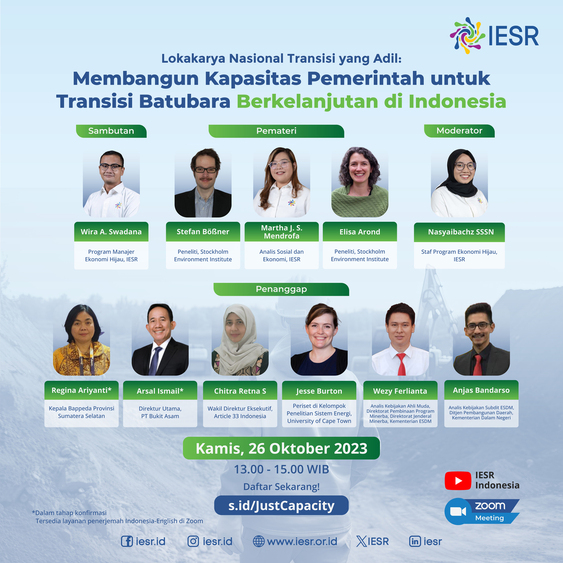
National Workshop on Just Transition: Building Capacity for Sustainable Coal Transition in Indonesia
Replay Event
Background
Indonesia, a nation rich in coal resources, stands at a pivotal juncture in its energy transition journey. The country faces significant challenges due to its heavy reliance on coal, including environmental degradation, public health issues, and economic imbalances. Recognizing the urgent need for a transformative shift towards sustainable energy sources, the Indonesian government is actively engaging in the concept of a ‘Just Transition.’ This transition framework emphasizes the importance of balancing environmental, social, and economic concerns, ensuring that no community or worker is left behind as the nation moves away from coal-dependent industries.
The coal industry, while contributing substantially to Indonesia’s economy, has taken a toll on the environment and the well-being of communities located near coal mines and power plants. The release of greenhouse gasses, deforestation, and water pollution are pressing environmental concerns. Moreover, the health of local populations is at risk due to air and water pollution, leading to increased respiratory diseases and other health issues. Additionally, the economic stability of regions heavily reliant on coal is vulnerable, necessitating diversification to ensure sustainable development. The imperative of transitioning away from fossil fuels is accompanied by the responsibility to ensure that this shift is not only environmentally sustainable but socially and economically just.
Central to the success of this complex transformation is the critical nexus between the Just Transition concept and the building of institutional capacities within the nation. Institutional capacity encompasses the collective knowledge, skills, policies, and resources that governmental bodies and organizations possess to plan, implement, and monitor sustainable development initiatives effectively. The bridging of Just Transition principles with the enhancement of institutional capacity is fundamental to navigate the intricate challenges presented by this monumental shift.
This synergy demands an integrated approach, one that marries the aspirations of a Just Transition — ensuring fair treatment for workers, fostering community engagement, promoting social equity, and preserving the environment — with the tangible skills and resources required to translate these aspirations into reality. It calls for a transformative shift in the way institutions operate, focusing not only on policy formulation but also on effective implementation, stakeholder engagement, and continuous learning.
The Stockholm Environment Institute (SEI) and the Institute for Essential Services Reform (IESR) are conducting a joint study on just transitions in Indonesia, in the area of assessing institutional capacity on covering the just transition issue. This study is part of a comparative research on just transitions away from fossil fuels in three coal-producing countries, namely Colombia, South Africa and Indonesia. Therefore, this study seeks to compare the different experiences, histories, and politics of coal production and initial efforts toward just transition to provide insights into the power dynamics and distributional politics that shape resistances to phasing out the fossil fuel economy, and opportunities for change. To do so, it relies on both primary and secondary data obtained from various sources and methods, including literature reviews, interviews and workshops.
Objectives
The overall objective of the workshop is to share and cross-validate the findings of the studies done by SEI and IESR on just transition in the coal producing provinces in Indonesia and catalyze collaborative policy actions to advance the transition goals. Specifically, the workshop aims to achieve the following:
- Convey the initial analysis of the study on central and regional government institutions’ capacity for Just Transition in Indonesia to the public;
- Acquire inputs on the results of the study on central and regional government institutions’ capacity for Just Transition in Indonesia from key stakeholders;
- Identify entry points for collaborative actions with various stakeholders to advance just transition agendas in Indonesia.
Presentation
Just Coal Transitions in Indonesia – Stefan Bößner
Just-Coal-Transitions-in-Indonesia-Stefan-BosnerJust Transitions form Thermal Coal in Colombia – Elisa Arond
Just-Transitions-form-Thermal-Coal-in-Colombia-Elisa-ArondNational and local government institutions’ capacity for just transition planning around coal in Indonesia – Martha Mendrofa
National-and-local-government-institutions-capacity-for-just-transition-planning-around-coal-in-Indonesia-Martha-Mendrofa_Speakers
-
Julius Christian- Research Manager- Institute for Essential Services Reform
-
Martha Jesica- Sosial and Economics Analyst- Institute for Essential Services Reform

